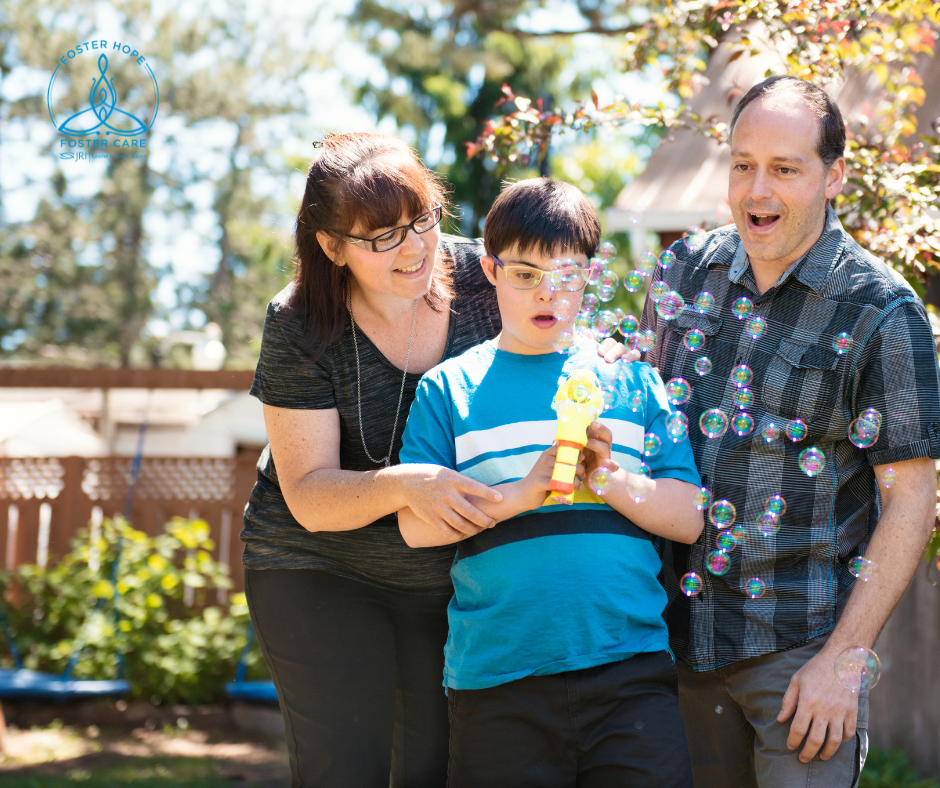Many folks want to foster, but they are not sure they have what it takes. They question, am I enough? Will I be able to do this? Do I have what a child needs?
Let’s explore what kids in care need. If you think it sounds like you, that might be a sign it is time to apply!
- A Steady Presence: Children and youth in care have been through a lot. While individual experiences can vary, all children and youth in care have experienced an upheaval of their lives. They need a caring adult who is calm, predictable, and reassuring.
- Clear Expectations: Kids in care do not know what to plan for, what is expected of them, what your rules are. You might live a very different life from anything they’ve ever experienced. Be clear with expectations, from the routine you have (dinner at 6PM) to rules (no food in the bedroom/take shoes off at the door/say please and thank you), and how to handle difficult moments (we take space when we are upset, we can let people know we don’t want to talk and will respect that, we can write notes to say how we are feeling if spoken words feel like too much). When kids know what to expect, they can start to relax. They don’t need to be on guard all the time. And when they know what is expected of them, they can rise to the occasion and shine!
- Time: This is probably the hardest, because we are all so pressed for time. Kids need someone to give them one-on-one time, even if it is a fifteen minute walk around the block, so they can talk, tell someone about their day, share a joy, share a worry, and know they are being heard. Foster parents also have to make time for meetings, like weekly case manager meetings and school meetings. It is a lot, but planning ahead and knowing it will be a lot means you can start to look at your current schedule and assess how you could fit fostering into your life.
- An Advocate: Kids need a person who will be on their team. Children’s voices are often the smallest, so they need an adult to stand up for them. This means educational, medical, mental health, and emotional wellness advocacy. Good foster parents make keen observations, communicate with their agency and other supports, and speak up for what will serve their child best in life.
- A Champion: Foster parents should tell their kiddos how wonderful they are. They should encourage them. They should let them know that their life has purpose and there are so many paths of possibilities in front of them. You should be the person who wants to give pep talks and help kids build resiliency.
- A Role Model: Foster parents don’t just talk the talk; they walk the walk. Foster parents teach kids by demonstrating healthy communication skills, showing emotional intelligence, practicing empathy, showing productive problem solving skills, accountability, and teaching healthy, socially appropriate behaviors. Children and youth are always watching what the adults in their lives are doing, so good foster parents do their best to be their best.
- Love: Love is a tricky thing. What makes one person feel loved may not resonate with another. For kids in care, this can be very complicated. Regardless, good foster parents show their love by showing up for a child, by encouraging them, respecting their boundaries, and providing assurance that they matter. Some children will thrive and blossom when their caring adults verbally tell them "I love you," while this would feel far too invasive to others. Good foster parents learn that love can be expressed in many ways and find the right way to demonstrate it to the child or youth in their care.
Children and youth in foster care don’t need a foster parent who is in a certain income bracket, has a particular level of education or degree, lives in a certain zip code, or drives a fancy car. They need caring adults who are committed to their success, believe they can grow, and show them that they are worthy of a beautiful life.
If this sounds like you, honor National Foster Care Month (or any month!) by completing your application today.














